外研(新标准)版七年级下Module 11 Body language Unit 3 Language in use课件(23张ppt 无素材)
文档属性
| 名称 | 外研(新标准)版七年级下Module 11 Body language Unit 3 Language in use课件(23张ppt 无素材) | 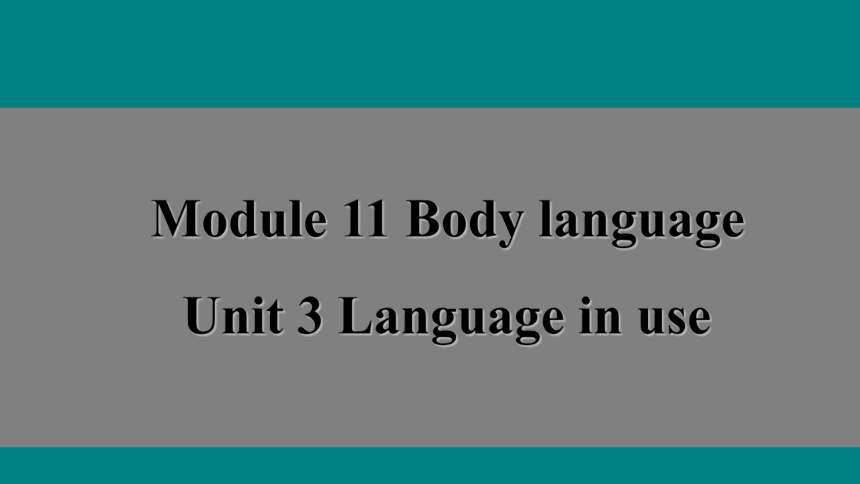 | |
| 格式 | pptx | ||
| 文件大小 | 1.2MB | ||
| 资源类型 | 教案 | ||
| 版本资源 | 外研版 | ||
| 科目 | 英语 | ||
| 更新时间 | 2021-12-12 22:39:09 | ||
图片预览

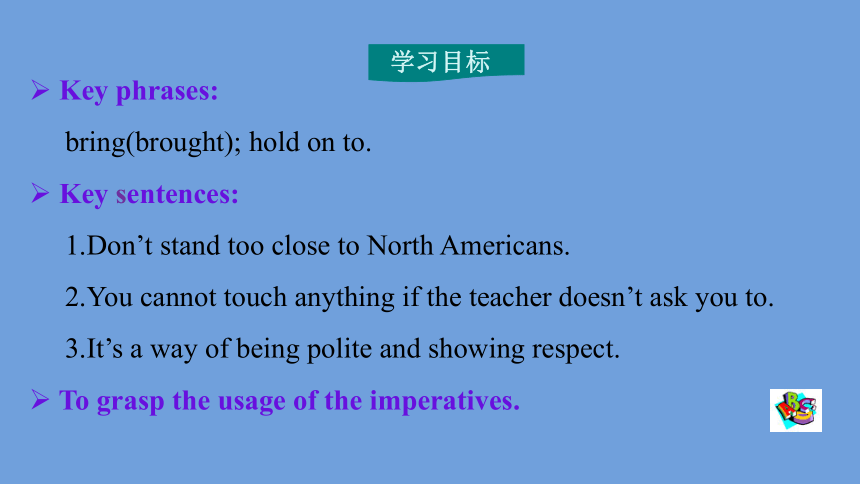
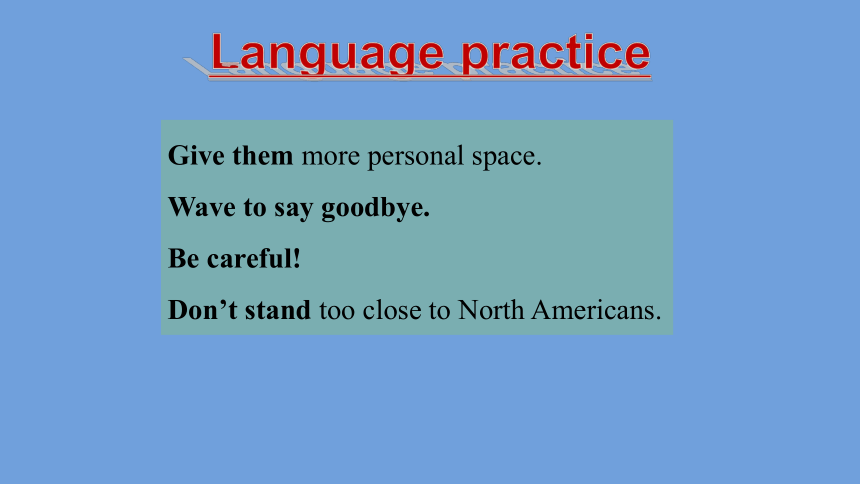

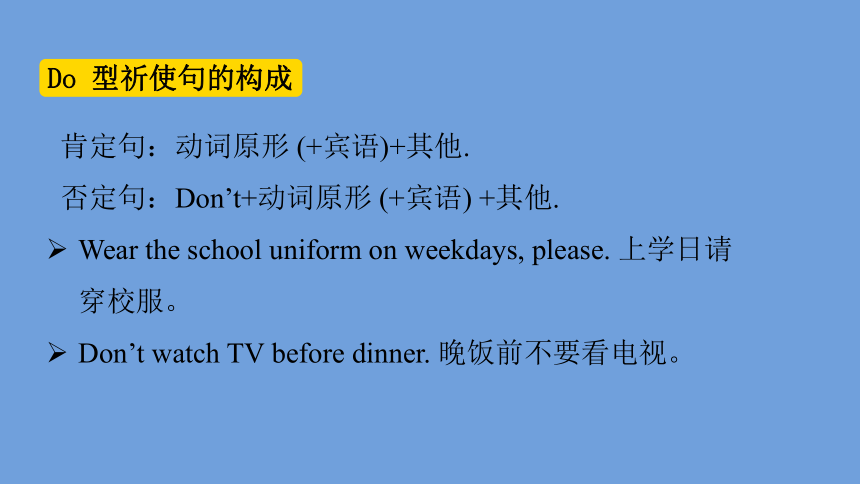

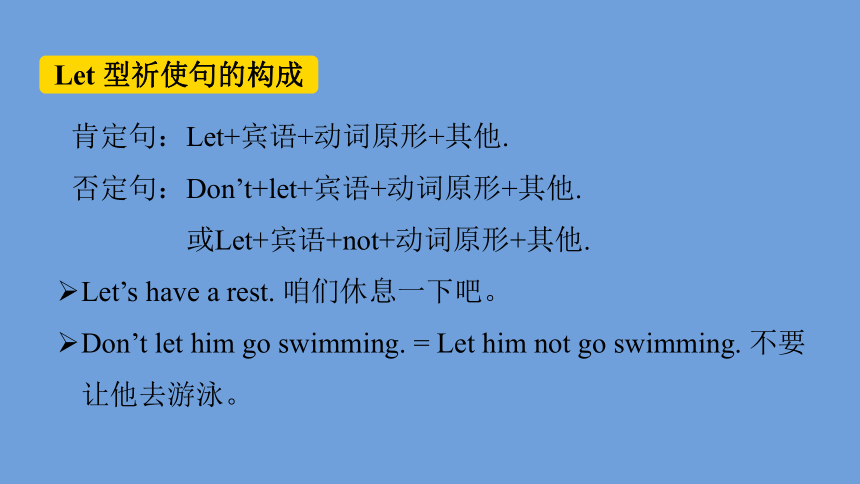
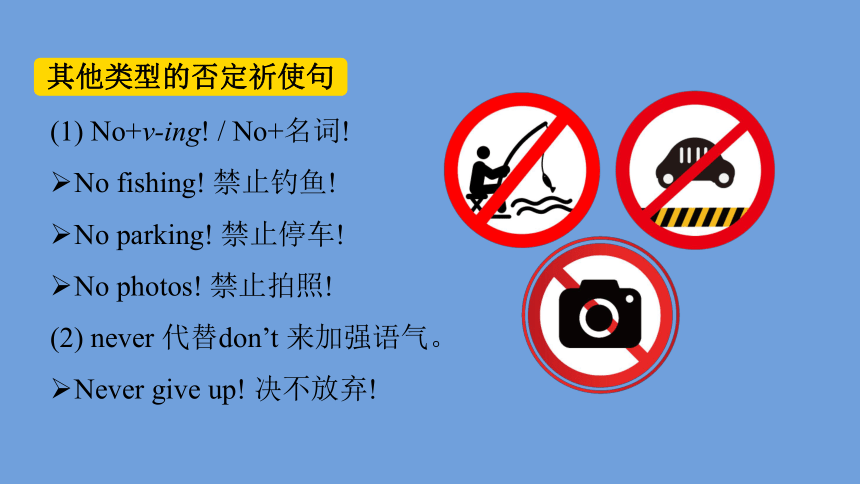
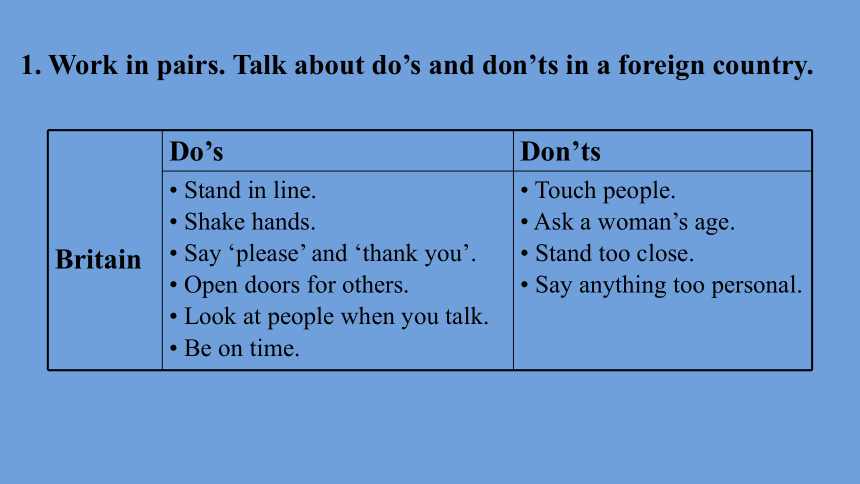
文档简介
(共23张PPT)
Module 11 Body language
Unit 3 Language in use
学习目标
Key phrases:
bring(brought); hold on to.
Key sentences:
1.Don’t stand too close to North Americans.
2.You cannot touch anything if the teacher doesn’t ask you to.
3.It’s a way of being polite and showing respect.
To grasp the usage of the imperatives.
Language practice
Give them more personal space.
Wave to say goodbye.
Be careful!
Don’t stand too close to North Americans.
Grammar
祈使句
祈使句一般用来表示请求、命令、劝说、号召、警告等。在祈使句中,通常省略主语you,其肯定形式以动词原形开头,否定形式是在动词原形前加don’t。祈使句句尾用句号或感叹号,读时用降调。为表示礼貌,可以在句首或句尾加上please。句末用please时,前面通常加逗号。
肯定句:动词原形 (+宾语)+其他.
否定句:Don’t+动词原形 (+宾语) +其他.
Wear the school uniform on weekdays, please. 上学日请穿校服。
Don’t watch TV before dinner. 晚饭前不要看电视。
Do 型祈使句的构成
肯定句:Be+表语+其他.
否定句:Don’t+be+表语 +其他.
Be careful next time.下次要细心。
Don’t be late for school! 上学不要迟到!
Be 型祈使句的构成
肯定句:Let+宾语+动词原形+其他.
否定句:Don’t+let+宾语+动词原形+其他.
或Let+宾语+not+动词原形+其他.
Let’s have a rest. 咱们休息一下吧。
Don’t let him go swimming. = Let him not go swimming. 不要让他去游泳。
Let 型祈使句的构成
其他类型的否定祈使句
(1) No+v-ing! / No+名词!
No fishing! 禁止钓鱼!
No parking! 禁止停车!
No photos! 禁止拍照!
(2) never 代替don’t 来加强语气。
Never give up! 决不放弃!
1. Work in pairs. Talk about do’s and don’ts in a foreign country.
Britain Do’s Don’ts
Stand in line. Shake hands. Say ‘please’ and ‘thank you’. Open doors for others. Look at people when you talk. Be on time. Touch people.
Ask a woman’s age.
Stand too close.
Say anything too personal.
2. Make a list of do’s and don’ts to help visitors to Britain.
Stand in line.
Don’t touch people when you talk to them.
…
Shake hands when you meet a friend.
Stand in line..
Please talk about the weather.
Say “please” and “thank you”.
Look at people when you talk
Don’t touch people.
Don’t ask people personal question.
Don’t ask women’s age.
Don’t talk with food in your mouth.
Don’t be late.
3. Rewrite the sentences.
It’s important to listen to the teacher.
Listen to the teacher.
You cannot shout in the classroom.
Don’t shout in the classroom.
1. It’s important to be careful.
2. It’s important to clean and tidy the lab.
3. You cannot touch anything if the teacher doesn’t ask you to.
4. You cannot bring food or drink into the lab.
5. You cannot enter the lab alone.
1. It’s important to be careful.
2. It’s important to clean and tidy the lab.
3. You cannot touch anything if the teacher doesn’t ask you to.
4. You cannot bring food or drink into the lab.
5. You cannot enter the lab alone.
Be careful.
Clean and tidy the lab.
Don’t touch anything if teacher isn’t ask you to.
Don’t bring food or drink into the lab.
Don’t enter the lab alone.
4. Answer the questions. Use the words and expressions from the box to help you.
all right arm in arm close different hold on to
kiss three times point at shake hands with wave
1.How do the British say hello to each other when they first meet
2. Does body language mean the same thing in different countries
They shake hands with each other.
No , it doesn’t.
3. How do the Russians say hello to each other when they meet
4. Is it polite to stand close to North Americans
5. Is it all right to wave goodbye in Greece
6. How do you usually say goodbye with body language
They usually kiss three times.
No ,it isn’t.
No ,it isn’t.
I wave my hand.
Around the world
The Japanese bow
In Japan, people bow to say “thank you”, “sorry” ,“hello”,“goodbye”, “you’re welcome”,“excuse me”, and many other things. Children and young people bow lower when they greet older people. It’s a way of being polite and showing respect.
Module task: Making a poster about body language
5. Work in pairs . Talk about different ways of saying hello and body language in China.
In China, people greet with each other with head nodding, smile, hand shaking, hug and so on. People kiss each other in public between males and females, which only happens between lovers and couples in private in China. People wave to say goodbye.
6. Write the information on your poster .
7. Find or draw some pictures to add to your poster.
8. Show your poster to the whole class.
一、用所给词的适当形式填空
Exercises
1. It isn’t polite___________(laugh) at others.
2. A ___________ (woman) age is secret in the western countries.
3. ___________(not talk) in class.
4. They waved ___________ (say) goodbye to us.
5. They come from different___________ (country).
to laugh
woman’s
Don’t talk
to say
countries
二、按要求完成句子
1. They can play the piano and sing songs. (改为否定句)
They______ play the piano______sing songs.
2. You can’t go to bed too late. (改为祈使句)
______ ______ to bed too late.
3.We aren’t late for school every day. (改为同义句)
We go to school ______ ______every day.
4.People bow to say “I’m sorry” in this country. (对画线部分提问)
______ ______ people say “I’m sorry” in this country
can’t
or
Don’t go
on time
How do
Homework
Preview Module 12 Unit 1.
Do the exercises in students’ book.
Thank you!
Module 11 Body language
Unit 3 Language in use
学习目标
Key phrases:
bring(brought); hold on to.
Key sentences:
1.Don’t stand too close to North Americans.
2.You cannot touch anything if the teacher doesn’t ask you to.
3.It’s a way of being polite and showing respect.
To grasp the usage of the imperatives.
Language practice
Give them more personal space.
Wave to say goodbye.
Be careful!
Don’t stand too close to North Americans.
Grammar
祈使句
祈使句一般用来表示请求、命令、劝说、号召、警告等。在祈使句中,通常省略主语you,其肯定形式以动词原形开头,否定形式是在动词原形前加don’t。祈使句句尾用句号或感叹号,读时用降调。为表示礼貌,可以在句首或句尾加上please。句末用please时,前面通常加逗号。
肯定句:动词原形 (+宾语)+其他.
否定句:Don’t+动词原形 (+宾语) +其他.
Wear the school uniform on weekdays, please. 上学日请穿校服。
Don’t watch TV before dinner. 晚饭前不要看电视。
Do 型祈使句的构成
肯定句:Be+表语+其他.
否定句:Don’t+be+表语 +其他.
Be careful next time.下次要细心。
Don’t be late for school! 上学不要迟到!
Be 型祈使句的构成
肯定句:Let+宾语+动词原形+其他.
否定句:Don’t+let+宾语+动词原形+其他.
或Let+宾语+not+动词原形+其他.
Let’s have a rest. 咱们休息一下吧。
Don’t let him go swimming. = Let him not go swimming. 不要让他去游泳。
Let 型祈使句的构成
其他类型的否定祈使句
(1) No+v-ing! / No+名词!
No fishing! 禁止钓鱼!
No parking! 禁止停车!
No photos! 禁止拍照!
(2) never 代替don’t 来加强语气。
Never give up! 决不放弃!
1. Work in pairs. Talk about do’s and don’ts in a foreign country.
Britain Do’s Don’ts
Stand in line. Shake hands. Say ‘please’ and ‘thank you’. Open doors for others. Look at people when you talk. Be on time. Touch people.
Ask a woman’s age.
Stand too close.
Say anything too personal.
2. Make a list of do’s and don’ts to help visitors to Britain.
Stand in line.
Don’t touch people when you talk to them.
…
Shake hands when you meet a friend.
Stand in line..
Please talk about the weather.
Say “please” and “thank you”.
Look at people when you talk
Don’t touch people.
Don’t ask people personal question.
Don’t ask women’s age.
Don’t talk with food in your mouth.
Don’t be late.
3. Rewrite the sentences.
It’s important to listen to the teacher.
Listen to the teacher.
You cannot shout in the classroom.
Don’t shout in the classroom.
1. It’s important to be careful.
2. It’s important to clean and tidy the lab.
3. You cannot touch anything if the teacher doesn’t ask you to.
4. You cannot bring food or drink into the lab.
5. You cannot enter the lab alone.
1. It’s important to be careful.
2. It’s important to clean and tidy the lab.
3. You cannot touch anything if the teacher doesn’t ask you to.
4. You cannot bring food or drink into the lab.
5. You cannot enter the lab alone.
Be careful.
Clean and tidy the lab.
Don’t touch anything if teacher isn’t ask you to.
Don’t bring food or drink into the lab.
Don’t enter the lab alone.
4. Answer the questions. Use the words and expressions from the box to help you.
all right arm in arm close different hold on to
kiss three times point at shake hands with wave
1.How do the British say hello to each other when they first meet
2. Does body language mean the same thing in different countries
They shake hands with each other.
No , it doesn’t.
3. How do the Russians say hello to each other when they meet
4. Is it polite to stand close to North Americans
5. Is it all right to wave goodbye in Greece
6. How do you usually say goodbye with body language
They usually kiss three times.
No ,it isn’t.
No ,it isn’t.
I wave my hand.
Around the world
The Japanese bow
In Japan, people bow to say “thank you”, “sorry” ,“hello”,“goodbye”, “you’re welcome”,“excuse me”, and many other things. Children and young people bow lower when they greet older people. It’s a way of being polite and showing respect.
Module task: Making a poster about body language
5. Work in pairs . Talk about different ways of saying hello and body language in China.
In China, people greet with each other with head nodding, smile, hand shaking, hug and so on. People kiss each other in public between males and females, which only happens between lovers and couples in private in China. People wave to say goodbye.
6. Write the information on your poster .
7. Find or draw some pictures to add to your poster.
8. Show your poster to the whole class.
一、用所给词的适当形式填空
Exercises
1. It isn’t polite___________(laugh) at others.
2. A ___________ (woman) age is secret in the western countries.
3. ___________(not talk) in class.
4. They waved ___________ (say) goodbye to us.
5. They come from different___________ (country).
to laugh
woman’s
Don’t talk
to say
countries
二、按要求完成句子
1. They can play the piano and sing songs. (改为否定句)
They______ play the piano______sing songs.
2. You can’t go to bed too late. (改为祈使句)
______ ______ to bed too late.
3.We aren’t late for school every day. (改为同义句)
We go to school ______ ______every day.
4.People bow to say “I’m sorry” in this country. (对画线部分提问)
______ ______ people say “I’m sorry” in this country
can’t
or
Don’t go
on time
How do
Homework
Preview Module 12 Unit 1.
Do the exercises in students’ book.
Thank you!
同课章节目录
- Module 1 Lost and found
- Unit 1 Whose bag is this?
- Unit 2 Are they yours?
- Unit 3 Language in use
- Module 2 What can you do ?
- Unit 1 I can play the piano
- Unit 2 I can run really fast
- Unit 3 Language in use
- Module 3 Making plans
- Unit 1 What are you going to do at the weekends?
- Unit 2 We're going to cheer the players.
- Unit 3 Language in use
- Module 4 Life in the future
- Unit 1 Everyone will study at home
- Unit 2 Every family will have a small plane.
- Unit 3 Language in use
- Module 5 Shopping
- Unit 1 What can I do for you?
- Unit 2 You can buy everything on the Internet
- Unit 3 Language in use
- Module 6 Around town
- Unit 1 Could you tell me how to get to the Nationa
- Unit 2 The London Eye is on your right.
- Unit 3 Language in use
- Revision module A
- Module 7 My past life
- Unit 1 I was born in a small village.
- Unit 2 I was born in Quincy.
- Unit 3 Language in use
- Module 8 Story time
- Unit 1 Once upon a time….
- Unit 2 Goldilocks hurried out of the house.
- Unit 3 Language in use
- Module 9 Life history
- Unit 1 He left school and began work at the age of
- Unit 2 He decided to be an actor.
- Unit 3 Language in use
- Module 10 A holiday journey
- Unit 1 What did you do?
- Unit 2 This morning we took a walk.
- Unit 3 Language in use
- Module 11 Body language
- Unit 1 They touch noses!
- Unit 2 Here are some ways to welcome them.
- Unit 3 Language in use
- Module 12 Western music
- Unit 1 It's so beautiful!
- Unit 2 Vienna is the centre of European classical
- Unit 3 Language in use
- Revision module B
